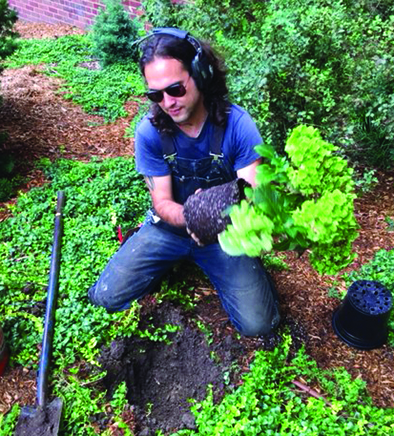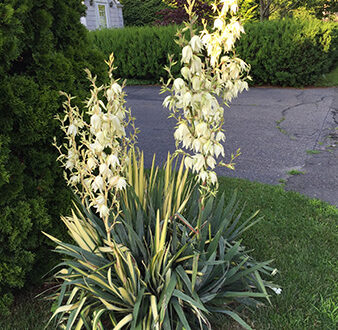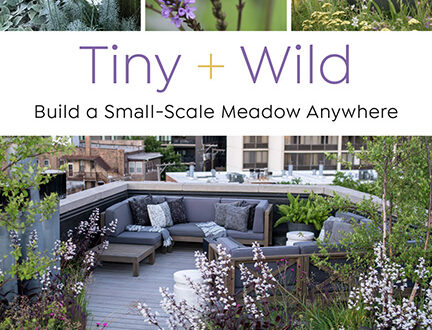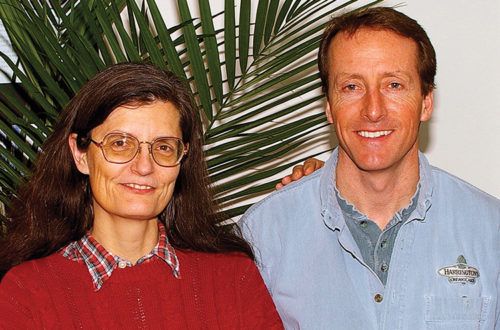By Manny Grossman
Soil care. The phrase often evokes apprehension and even fear amongst new gardeners.
As a longtime teacher of soil science at the New York Botanical Garden, I hear it all the time. “Will I need to bring in truckloads of compost?” “When is the best time to double dig and rototill?” And let’s not forget the old classic, “What is the best product to buy for my soil?”
Well, I’m here to allay all your fears and apprehensions. No, the truth is that soil care and management is actually really easy. And pretty inexpensive, too. Why? Because the less you do the better your results will be. We are going to show you the way forward from your rototiller.
Let’s back up for a moment and look at what soil actually is. Soil is a ‘prepared product’ that is the result of many thousands of years of geologic processes.
It consists of four ingredients: 25% air, 25% water, 45% crushed rock and 5% organic matter (the rotting dead stuff). All four are required in order to have what we call soil. Plants use the elements from the rock minerals as well as the nitrogen, phosphorus and potassium that comes from the decaying organic matter.
Soil is also an ecosystem. There are billions of lives all living out their destinies down there. This ecosystem, like all ecosystems, likes to be left alone. After all, would you like a wrecking ball smashing into your living room window when you’re trying to enjoy a quiet evening? Probably not. Metaphorically speaking, you are that wrecking ball with your rototiller, hoe, fork and shovel.
So, the challenge we face is how do we maintain our soil in a way that respects the natural processes that contribute to healthy plant growth?
The answer really lies in abandoning the destructive practices we have learned from past generations. Double digging, rototilling and excessive cultivation areall practices that must end, except in the most extreme of circumstances. You should only consider these practices if your soil is compacted and concrete-like.
In other words, do these things if your soil is dead. You can’t kill something that’s already dead so, in this case, the cultivator and soil amendments loosen the soil and get the biology started again.
However, you can kill something that’s alive, and chances are your soil is alive. Don’t kill it.
So, what do we do? Well, very simply just start where you’re at. You can’t go back in time. All you can do is start a program of organically based soil care and your plants will thrive from that point on. Here’s a checklist of things to stop doing and why.
Tilling is Killing
Tilling your soil is killing your soil. Soil has a built-up structure that is very important to keep intact. There are air spaces and worm tunnels that allow for water and air infiltration. There are also small crumb pieces that form in your soil that are also important.
Rototilling is an extremely violent process that destroys all of this. Quite simply, your plant roots don’t need the help. And the soil life is enjoying itself down there. Leave it all alone.
Cultivation
Like rototilling, excessive cultivation tends to destroy crumb structure, introduce too much oxygen into the soil, and rip feeder roots of plants. Also, all that CO2 sequestered away in the soil can become airborne the more you open the soil up.
Double Digging
This is a really weird one that I never understood. Double digging involves taking the subsoil and topsoil out and reversing their placement. This is strange and nature does not really do this. Therefore it is not necessary for plant roots. Your plants do not need super loose soil. Their roots are more than capable of penetrating.
Digging in General
Do some research on the “No-Till” and “No-Dig” movements for further info. There are many benefits to your plants, garden and environment to not digging your soil, except to plant something.
Editor’s Note: I had to learn this lesson myself, with a little help from Anne and Jeff Lowenfels. Early on I picked up the idea, like many people, that cultivating the soil with shovels and rototillers was a good thing. Wrong!
I’m a big believer and follower of Bruce Lee’s philosophy of “be water.” And by this he meant go with the flow. Don’t try to fight with everything in your path. Older-school gardeners, unfortunately, do fight nature.
They buy a chemical for every pest or disease. They buy all sorts of artificial and toxic fertilizers for their plants. Few realize that they themselves hold the key to a beautiful garden without the use of unnecessary chemicals.
As a gardener, you need to ask what legacy you’re leaving. The chemicals available to buy are often extremely toxic. The use of them can have devastating and often unseen effects. You are harming future life by using them. Stop it.
Next time you’re on line at the nursery, see if there is a maple or oak tree in front of you on line with a bottle of fertilizer in its hand. If not, then ask, how does nature take care of itself? Can I do the same thing? The answer is yes, nature takes care of itself and does it by recycling nutrients, and you can apply that to your gardening techniques.
Start valuing the detritus and debris that you often bag up and throw on the curb for trash pickup. That is all future nitrogen, phosphorus and potassium.
• You are going to start composting and start using leaves as mulch.
• You are going to replace your prunings and trimmings back to the land they grew on.
• You are going to use mulches to keep an organic layer rotting on your soil and you are going to replace that mulch when it gets digested by the soil and turned into humus.
• You’re occasionally going to buy compost for seasonal nutritional re-inforcement. It’s powerful stuff though. Don’t overdo it.
I take care of very large New York City landscapes and never use artificial chemicals on my plants. I challenge myself every time I am gardening to not have a bag of debris for the garbage truck. My plants are fantastically healthy and never get diseases. The added benefit is I get to work on clean landscapes and don’t poison myself or my clients.
Gardening is actually really easy. We just tend to overcomplicate it. Your soils are probably just fine. They just need occasional care. As long as you apply mulches to your soil, and leave it alone as much as possible, you will notice improvements in your plants. Always ask yourself “What does nature do?” and follow that. It will be your best guide.
Manny Grossman is a NYC-based gardener whot specializes in maintaining large properties. He is sought out for his natural approach to gardening. He is a veteran instructor at the New York Botanical Garden’s School of Continuing Education where he teaches plant science, soil science and various plant ID classes. He is also a certified permaculture instructor and designer.





